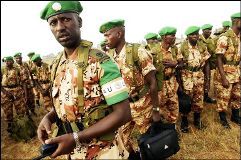West waiting for African solutions to African wars
By Terry Leonard, Associated Press Writer
JOHANNESBURG, South Africa, Aug 21, 2004 (AP) — As the month-end deadline nears for Sudan to disarm the mostly Arab pro-government militias in Darfur, the United Nations and Western powers are in a dilemma over how far to go to stop the killing in an African country.
 Still haunted by the fiasco in Somalia a decade ago, the West is reluctant to intervene militarily in Africa – afraid of being dragged into a quagmire far from home while troops are still tied down in Iraq and Afghanistan.
Still haunted by the fiasco in Somalia a decade ago, the West is reluctant to intervene militarily in Africa – afraid of being dragged into a quagmire far from home while troops are still tied down in Iraq and Afghanistan.
Western nations want Africa to lead – to find African solutions for African problems. But analysts say the governments of the continent lack the cohesion, resources and political will.
“It is terrible. The West finds a need to follow an African lead, and Africa is not ready to lead,” said Greg Mills, director of the South African Institute of International Affairs.
In Sudan’s Darfur region, at least 1.2 million black Africans have fled the militias, called Janjaweed, that have killed thousands of civilians in response to a rebellion.
The African Union is taking various approaches to dealing with the Darfur conflict, offering to host peace talks in Nigeria between African rebels and the Sudanese government starting Monday and providing forces to protect monitors of an April 8 cease-fire agreement.
But Africa’s capacity to supply troops is limited, analysts say.
“What is needed now is for someone to go in – not with a peacekeeping force but with an enforcement force,” said Chris Landsberg, co-director of the South African Center for International Relations. “The African Union is not ready for that. They are already overstretched in Burundi and Congo.”
While Africans die, the West debates whether to classify the deaths as genocide, as the U.S. Congress and some humanitarian groups have declared, or ethnic cleansing.
Landsberg accused the West of seeking ways to avoid calling the Janjaweed attacks a genocide – a definition that would require action under the 1948 Geneva Convention.
However, in the case of Darfur, he said, “I think we are heading for genocide unless decisive action is taken.”
A decade ago, Hutu extremists in Rwanda slaughtered more than 500,000 people, mostly Tutsis, while the U.N. Security Council, paralyzed by events in Somalia to the north, watched from afar. Instead of beefing up its peacekeepers in the country, it pulled them out.
Today, all agree more should have been done.
Now, faced with another killing field in Africa, there still is no clear idea how to proceed.
Both the United States and the United Nations bluntly told Sudan to end the violence and disarm the Janjaweed by Aug. 31. They threatened punitive sanctions and hinted at military intervention but have not yet announced what actions they will take.
The 15-nation Security Council is due to consider what action to take at the end of August, with options ranging from extending the deadline for another 30 days to imposing punitive measures.
On Friday, ahead of British Foreign Secretary Jack Straw’s visit to Sudan, his aides told reporters that most council members oppose heavy sanctions.
The Sudanese government says it has made a start but needs more time, and it has angrily rejected the idea of foreign intervention.
Mills expects the United Nations to buy time on Darfur by extending the deadline and requiring more monitoring.
“The U.N. doesn’t have the stomach or political will to act in this region,” Mills said.
Somalia is the oft-cited reason for Western reluctance in Africa, even though that effort did save people from a civil war-induced famine that already had killed 370,000.
U.S.-led troops landed in December 1992, made sure food relief got to the people and defeated the famine. The United Nations credited the troops with saving at least 100,000 lives.
But the mission’s role gradually changed from feeding the people to fighting the warlords who caused the famine. After 29 U.S. soldiers died in action, 18 in a single battle, the Americans and ultimately all other Western forces withdrew.
Now Darfur may be a test case for the West’s genuine engagement and willingness to disprove critics, who say the ethnic cleansing that took the West to war in the former Yugoslavia was smaller-scale than that in western Sudan.
“The West has allowed the quagmire argument to become a cheap alibi – just like finding African solutions for African problems has become an alibi for inaction,” Landsberg said.
Analysts note that in the few cases when the West has intervened, the record has been good.
When British troops landed in Sierra Leone in 2000, major fighting stopped almost immediately. French forces blocked a rebel advance on the Ivory Coast capital in 2002. And the Americans, with only a tiny show of force, helped quell the violence in the Liberian capital last year.
Since Somalia, the West has trained African troops for peacekeeping and offered to help supply and bankroll some operations.
Tom Cargill, the program coordinator at International African Institute in London, said results have varied, but peacekeeping operations by African troops, mostly Nigerian, in West Africa were relatively successful. There are tens of thousands of troops under the U.N. flag now in Africa and the vast majority are African.
The West, partly because of the need for oil and the threat of terrorism, talks a lot these days about more engagement with Africa. And while there is involvement here, especially high-level military cooperation, analysts say a large gap remains between rhetoric and action.
